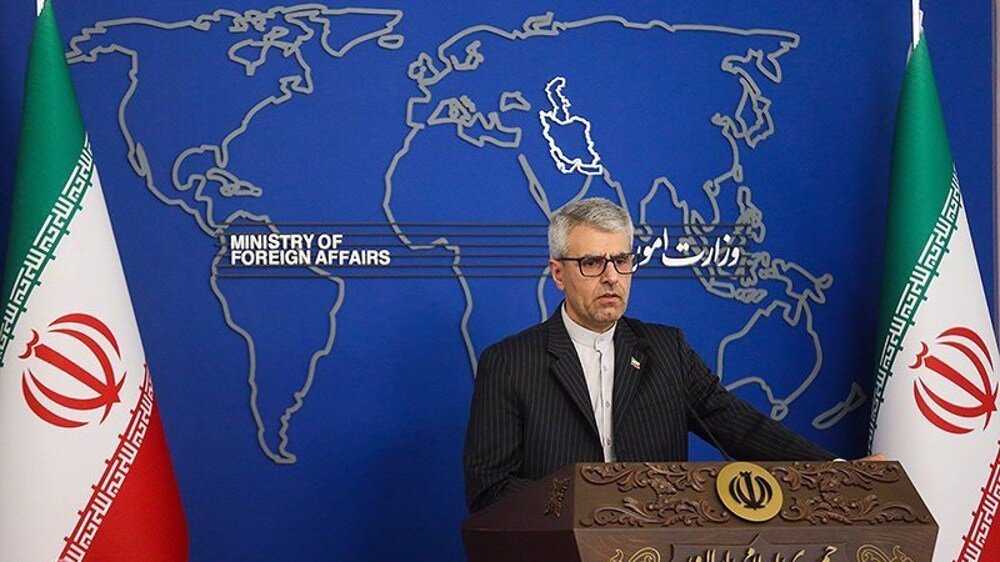U.S. sanctions signal hostility, not diplomacy: Iran foreign ministry

TEHRAN – Iran has strongly condemned the latest round of U.S. sanctions, saying they reveal Washington’s persistent hostility toward the Iranian nation and cast serious doubt on American claims of diplomatic goodwill.
At a weekly press conference on Monday, Foreign Ministry Spokesman Esmaeil Baghaei accused the United States of pursuing a path that not only undermines negotiations but also amounts to what he described as a “crime against humanity.”
“Every new sanctions package increases the burden of responsibility on American officials,” Baghaei told reporters. “It’s a clear message that the U.S. is not committed to diplomacy and instead holds a fundamentally antagonistic stance toward the people of Iran.”
The spokesman stressed that Iran remains fully transparent in its nuclear activities and continues to advocate for dialogue and peaceful resolution. “Our nuclear program is entirely peaceful. We have nothing to hide. Our willingness to negotiate demonstrates our seriousness,” he said, warning that continued sanctions would only erode Tehran’s trust in the negotiation process.
Despite ongoing indirect nuclear talks between Iran and the United States—currently mediated by Oman and having undergone four rounds so far—Baghaei said Washington’s actions contradict its rhetoric. “How can the U.S. claim to seek diplomacy while expanding measures that aim to economically and politically suffocate the Iranian nation?” he asked.
‘Nuclear enrichment not up for debate’
Turning to remarks from U.S. officials suggesting Iran should be denied even minimal enrichment capabilities, Baghaei firmly rejected the idea. “Enrichment is a natural and non-negotiable component of our peaceful nuclear industry,” he said, adding that this technology is essential for Iran’s energy future.
Iranian Foreign Minister Abbas Araghchi echoed the stance during a separate engagement, warning the U.S. against making “unrealistic demands.” He stressed that Tehran will continue its enrichment activities regardless of the outcome of negotiations. “Statements coming from Washington are often detached from the realities at the table,” Araghchi noted during a phone call with his Turkish counterpart, Hakan Fidan.
In an interview with ABC’s “This Week”, Witkoff said the Trump administration’s “red line” in nuclear talks with Iran is that Tehran cannot maintain any ability to enrich uranium.
“We have one very, very clear red line, and that is enrichment. We cannot allow even 1% of an enrichment capability,” Witkoff added.
“Everything begins… with a deal that does not include enrichment… because enrichment enables weaponization, and we will not allow a bomb to get here.”
‘Snapback mechanism lacks legal justification’
Responding to recent discussions among European nations about invoking the JCPOA’s snapback mechanism—a provision allowing the reimposition of suspended UN sanctions—Baghaei warned against such a move. “The snapback mechanism lacks legal justification. Our nuclear activities are peaceful and fully transparent,” he stated.
He added that triggering the mechanism would signal a complete abandonment of diplomacy, calling it a “double-edged sword” that would invite reciprocal Iranian measures. “We hope European countries reconsider their approach and refrain from misusing tools of intimidation,” Baghaei urged.
‘Israel is sabotaging peace efforts’
Baghaei also accused Israel of playing a “destructive and destabilizing” role in the region and the nuclear talks. He cited numerous Israeli actions, including the assassinations of Iranian scientists and attacks across the region, as evidence of Tel Aviv’s intent to derail peace and provoke conflict.
He cautioned that Israel may attempt to frame Iran in a bid to escalate tensions in the region. “All countries must remain alert to ensure international peace is not undermined by Israeli provocations,” he warned.
The spokesman praised Oman and Qatar for their constructive mediation in the ongoing negotiations, highlighting Tehran’s strong diplomatic ties with Persian Gulf states. He noted that Foreign Minister Araghchi had recently discussed regional developments with officials from Saudi Arabia, the UAE, Oman, and Qatar.
Baghaei emphasized that Iran hopes for greater regional cooperation based on mutual interests and independence from external influence. “We expect our neighbors to support regional stability and avoid falling into the agendas of non-regional actors,” he said.
Closing the briefing, Baghaei confirmed that discussions on a long-term strategic partnership treaty with Russia are progressing. He said initial groundwork began under the late Foreign Minister Hossein Amir-Abdollahian, who died in a helicopter crash in May 2024. “The Iranian Parliament will soon review the treaty, continuing his legacy of diplomacy and strategic vision,” he added.
Leave a Comment